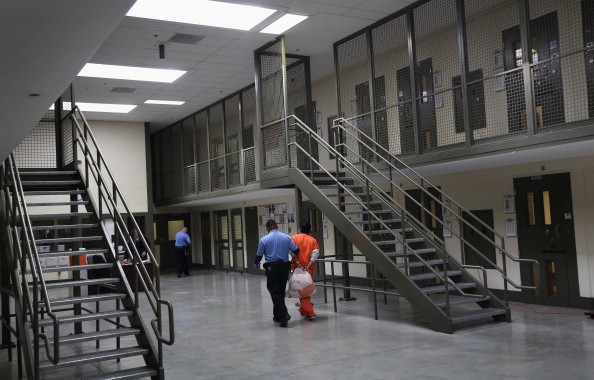




“I Am In Prison And I Have A Second Case” – The Colorado The Uniform Mandatory Disposition of Detainers Act (“UMDDA”)
By H. Michael Steinberg Colorado Criminal Defense Lawyer – Attorney

_____________________
“I Am In Jail And I Have A Second Case” – The Colorado The Uniform Mandatory Disposition of Detainers Act (“UMDDA”) Act
“I Am In Prison And I Have A Second Case” – The Colorado Uniform Mandatory Disposition of Detainers Act (“UMDDA”) – One of the most frustrating experiences while waiting in prison is to have a second or even a third case pending in Colorado that has not been resolved.
Enter the Colorado The Uniform Mandatory Disposition of Detainers Act (“UMDDA”) Act.
The UMDDA and the Interstate Agreement on Detainers (IAD) provide the method to resolve secondary pending criminal cases both in state (the UMDDA) and out of state (the IAD).
These laws provide a different kind of speedy trial right.
This article focuses on in state cases. Inmates use the UMDDA to “light a fire,” so to speak, under the authorities in other counties to resolve and bring to a speedy and “final disposition” untried charges. These untried cases act as detainers and impact jail and prison rehabilitation programs that can be disrupted by the mere existence of other cases in other Colorado counties.
What Is A Detainer?
A Colorado “detainer” results when a hold due to an arrest warrant is placed on a inmate to insure that the inmate, upon completion of their prison term, is available to be prosecuted by another jurisdiction – that is – the jurisdiction “placing” the detainer.
A detainer has the impact of stopping the plans for rehabilitation of the prisoner. It represents the threat of further a a new prosecution and additional punishment that will follow, in consecutive fashion, at the end of an inmate’s jail or prison term.
After a detainer is placed, the status of the inmate changes, usually their security clearance is increased, and they lose privileges that can include preferred living quarters, “trusty” status, furlough or transition programs (from jail to work or education release etc.
A detainer also may delay the second or third prosecution from resolving through a plea bargain that permits serving a concurrent sentences.
Finally, the inmate suffers psychologically not knowing whether he or she will be taken, at the end of their sentence, to another jurisdiction to start a new sentence. The goal of self-improvement is impacted along with the ability of the jail to rehabilitate the inmate in the long term
However a detainer is not necessary for a Colorado inmate to take advantage of this law. The filing of a detainer not required to seek protection under the UMDDA.
This link will take you to an excellent law review article that addresses these issues.
How The UMDDA Works – The Uniform Mandatory Disposition of Detainers Act
The UMDDA provides that:
…any person who is imprisoned . . . may request final disposition of any untried indictment or complaint pending against the person in this state.
(After the request is made (using standard forms that are provided by the State)
The commissioner then must send copies of the request and information regarding the remaining term of the prisoners commitment to the district court and the prosecuting attorney.
[HMS – After that – the following law “kicks in.”]
§ 16-14-104. Trial or dismissal
(1) Within one hundred eighty-two days after the receipt of the request by the court and the prosecuting official, or within such additional time as the court for good cause shown in open court may grant, the prisoner or the prisoner’s counsel being present, the indictment, information, or criminal complaint shall be brought to trial; but the parties may stipulate for a continuance or a continuance may be granted on notice to the prisoner’s attorney and opportunity to be heard. If, after such a request, the indictment, information, or criminal complaint is not brought to trial within that period, no court of this state shall any longer have jurisdiction thereof, nor shall the untried indictment, information, or criminal complaint be of any further force or effect, and the court shall dismiss it with prejudice.
(2) Any prisoner who requests disposition pursuant to section 16-14-102 may waive the right to disposition within the time specified in subsection (1) of this section by express waiver on the record after full advisement by the court. If a prisoner makes said waiver, the time for trial of the indictment, information, or criminal complaint shall be extended as provided in section 18-1-405(4), C.R.S., concerning waiver of the right to speedy trial
Compare Colorado’s Right To A Speedy Trial
Section 18-1-405 is Colorado’s “Speedy trial” law
It provides:
[I]f a defendant is not brought to trial on the issues raised by the complaint, information, or indictment within six months from the date of the entry of a plea of not guilty, . . . the pending charges shall be dismissed, and the defendant shall not again be indicted, informed against, or committed for the same offense . . .Here is a link to Colorado’s entire Speedy Trial Law – Colorado Speedy Trial Law 18-1-405.
The Speedy Trial Provision – What Makes All Of This Worth It
If an inmate follows the UMDDA’s provisions properly – then untried charges that are not resolved or go to trial within 182 days of the date the court and prosecutor received notice under the UMDDA must be dismissed with prejudice….UNLESS the Court finds good cause to extend the time period.
One note, the inmate cannot be mentally incompetent for the Act to apply and the inmate must be in the physical custody of the state… that is he or she must be a “prisoner.”
The UMDDA protects the rights of prisoners who, because they have pending charges somewhere in Colorado, are prevented from participating in work programs and other rehabilitative jail or prison services.
As the Colorado Supreme Court has stated:
[T]he primary purpose of the [UMDDA], as with its counterpart, the [Interstate Agreement on Detainers] is to provide a mechanism for prisoners to insist upon speedy and final disposition of untried charges that are the subjects of detainers so that prison rehabilitation programs initiated for the prisoners benefit will not be disrupted or precluded by the existence of these untried charges.
If a Defendant is incarcerated he will face barriers to participate in prison work and rehabilitation programs because of pending criminal charges on the other hand, if a prisoner makes bail, or is on probation or parole and therefore have been released from the physical custody of the state, these laws do NOT apply to them.
Know your rights!
The Key UMDDA Statutes:
16-14-101. Short title.
This article shall be known and may be cited as the “Uniform Mandatory Disposition of Detainers Act”.
16-14-102. Request for disposition of untried complaint or information.
(1) Any person who is in the custody of the department of corrections pursuant to section 16-11-301 or parts 8 and 9 of article 1.3 of title 18, C.R.S., may request final disposition of any untried indictment, information, or criminal complaint pending against him in this state. The request shall be in writing addressed to the court in which the indictment, information, or criminal complaint is pending and to the prosecuting official charged with the duty of prosecuting it and shall set forth the place of confinement.
(2) It is the duty of the superintendent of the institution where the prisoner is confined to promptly inform each prisoner, in writing, of the source and nature of any untried indictment, information, or criminal complaint against him of which the superintendent has knowledge, and of the prisoner’s right to make a request for final disposition thereof.
(3) Failure of the superintendent of the institution where the prisoner is confined to inform a prisoner, as required by subsection (2) of this section, within one year after a detainer from this state has been filed with the institution where the prisoner is confined shall entitle the prisoner to a dismissal with prejudice of the indictment, information, or criminal complaint.
16-14-103. Duties of superintendent upon delivery of request.
(1) Any request made pursuant to section 16-14-102 shall be delivered to the superintendent where the prisoner is confined who shall forthwith:
(a) Certify the term of commitment under which the prisoner is being held, the time already served on the sentence, the time remaining to be served, the earned time earned, the time of parole eligibility of the prisoner, and any decisions of the state board of parole relating to the prisoner; and
(b) Send, by registered mail, a copy of the request made by the prisoner and a copy of the information certified under paragraph (a) of this subsection (1) to both the court having jurisdiction of the untried offense and to the prosecuting official charged with the duty of prosecuting the offense.
16-14-104. Trial or dismissal.
(1) Within one hundred eighty-two days after the receipt of the request by the court and the prosecuting official, or within such additional time as the court for good cause shown in open court may grant, the prisoner or the prisoner’s counsel being present, the indictment, information, or criminal complaint shall be brought to trial; but the parties may stipulate for a continuance or a continuance may be granted on notice to the prisoner’s attorney and opportunity to be heard. If, after such a request, the indictment, information, or criminal complaint is not brought to trial within that period, no court of this state shall any longer have jurisdiction thereof, nor shall the untried indictment, information, or criminal complaint be of any further force or effect, and the court shall dismiss it with prejudice.
(2) Any prisoner who requests disposition pursuant to section 16-14-102 may waive the right to disposition within the time specified in subsection (1) of this section by express waiver on the record after full advisement by the court. If a prisoner makes said waiver, the time for trial of the indictment, information, or criminal complaint shall be extended as provided in section 18-1-405 (4), C.R.S., concerning waiver of the right to speedy trial.
16-14-107. Prisoners to be informed of provisions of article.
The superintendent shall arrange for all prisoners under his care and control to be informed in writing of the provisions of this article and for a record thereof to be placed in each prisoner’s file.
“I Am In Prison And I Have A Second Case” – The Colorado The Uniform Mandatory Disposition of Detainers Act (“UMDDA”)
If you found any of the information I have provided on this web page article helpful please click my Plus+1 or the Share buttons below so that others may also find it.
Never stop fighting – never stop believing in yourself and your right to due process of law.
ABOUT THE AUTHOR: H. Michael Steinberg – Email The Author at [email protected] – A Denver Colorado Criminal Defense Lawyer – or call his office at 303-627-7777 during business hours – or call his cell if you cannot wait and need his immediate assistance – 720-220-2277. Attorney H. Michael Steinberg is passionate about criminal defense. His extensive knowledge and experience of Colorado Criminal Law gives him the edge you need to properly handle your case.
 You should be careful to make a responsible choice in selecting a Colorado Criminal Defense Lawyer – and we encourage you to “vet” our firm. Over the last 40 plus years – by focusing ONLY on Colorado criminal law – H. Michael has had the necessary time to commit to the task of constantly updating himself on nearly every area of criminal law, to include Colorado criminal law and procedure and trial and courtroom practice. H. Michael works hard to get his clients the best possible results in and out of the courtroom. He has written, and continues to write, extensively on Colorado criminal law and he hopes this article helps you in some small way – “I Am In Prison And I Have A Second Case” – The Colorado The Uniform Mandatory Disposition of Detainers Act (“UMDDA”).
You should be careful to make a responsible choice in selecting a Colorado Criminal Defense Lawyer – and we encourage you to “vet” our firm. Over the last 40 plus years – by focusing ONLY on Colorado criminal law – H. Michael has had the necessary time to commit to the task of constantly updating himself on nearly every area of criminal law, to include Colorado criminal law and procedure and trial and courtroom practice. H. Michael works hard to get his clients the best possible results in and out of the courtroom. He has written, and continues to write, extensively on Colorado criminal law and he hopes this article helps you in some small way – “I Am In Prison And I Have A Second Case” – The Colorado The Uniform Mandatory Disposition of Detainers Act (“UMDDA”).

Other Articles of Interest:
- Mandatory Sentencing To Jail – Prison For Repeat Convictions For Felony Theft – 18-4-413
- Colorado Expands Mandatory Reporting Law To Cover The Elderly In 2014
- Transitioning From The Colorado DOC (Prison System) To The Colorado Community Corrections System (Half Way House System)
- Colorado Extradition Law – Can I Post Bail Before I Am Extradited?
- Colorado Theft – Statute Of Limitations Starts At “Discovery Of The Crime” – 16–5–401 And 18-4-401.












